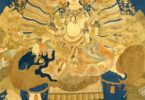《百喻经》
[The] Sūtra [Of A] Hundred Parables
(四五)奴守门喻
(45) Parable [Of The] Servant Guarding [The] Door
譬如有人将欲远行,敕其奴言:「尔好守门并看驴索。」
For example, [there] was [a] person [who] will [be] about [to] travel far, ordering his servant, saying, ‘You [should] well guard [the] door, and look [after the] donkey’s rope.’
其主行后,时邻里家有作乐者,此奴欲听不能自安,寻以索系门置于驴上,负至戏处听其作乐。
After his master [left to] travel, [the] neighbour’s house then had those making music. [As] this servant desired [to] hear [it, and was] not able [to have] himself [at] peace, immediately with [the] rope, [he] tied [it to the] door [and] placed [it] on [the] donkey above, carrying [it to] arrive [at the] show’s place [to] listen [to] those making music.
奴去之后,舍中财物贼尽持去。
After that servant left, [the] wealth [and] property within [the] house [were by] thieves completely grasped away.
大家行还,问其奴言:「财宝所在?」
[When] everyone [from] travelling returned, [they] asked that servant, saying, ‘[Of the] wealth [and] treasures, where are [they]?’
奴便答言:「大家先付门驴及索,自是以外非奴所知。」
[The] servant then replied, saying, ‘[As] everyone earlier instructed [on the] door, donkey and rope, besides these, those beyond [are] not [that this] servant knows.’
大家复言:「留尔守门正为财物,财物既失用于门为?」
Everyone again said, ‘[As] leaving you [to] guard [the] door precisely [is] for [the] wealth [and] property, [with the] wealth [and] property already lost, [of what] use [is the] door for?’
生死愚人为爱奴仆亦复如是,如来教诫常护根门,莫着六尘,守无明驴看于爱索。
[In the cycle of] birth [and] death, foolish people [who] are [with] love [as its] servants [are] likewise thus. [The] Thus Come [One] instructed [to] constantly protect [the] roots’ doors, [to] not [be] attached [to the] six dusts, [to] guard ignorance’s donkey, [and to] look at love’s rope.
而诸比丘不奉佛教,贪求利养诈现清白静处而坐,心意流驰贪着五欲,为色声香味之所惑乱,无明覆心爱索缠缚,正念觉意道品财宝悉皆散失。
However, many Bhikṣus [do] not practise [the] Buddha’s teachings. Greedily seeking profit [and] gain, pretending [to] appear pure, [in] quiet places then sitting, [with their] minds’ thoughts flowing [and] chasing [with] greedy attachment [to the] five desires, by forms, sounds, smells [and] flavours, those confused. [With] ignorance covering [their] minds [and by] love’s rope bound, [with] Right Mindfulness, awakening [of the] mind [and] path factors, [their] wealth [and] treasures [are] all scattered [and] lost.
[Note: We should be masters of attachment, instead of being its servants. As the door represents the six (sense) roots (六根) (of eye, ear, nose, tongue, body and thought [眼耳鼻舌身意]), the donkey represents ignorance (无明), and the rope represents love (爱: attachment), when there is guarding of the door, all within will naturally be guarded too.
Thus, when there is Right Mindfulness (正念) (of the senses), there will not be giving in to ignorance and attachment to the five desires (五欲) (for wealth, sex, fame, food and sleep [财色名食睡]) in terms of the six dusts (六尘) (of forms, sounds, smells, flavours, touches and thoughts [色声香味触法]). If this mindfulness is missing, ignorance and attachment will dominate, while losing the path’s motivation (菩提心: Bodhi Mind) and all its related path factors (道品).]
Namo Amituofo : Translation and notes by Shen Shi’an
上个喻
Previous Parable:
欲食半饼喻
[44] The Parable Of Desiring To Eat Half A Pancake
https://purelanders.com/2023/09/07/44-the-parable-of-desiring-to-eat-half-a-pancake-from-the-sutra-of-a-hundred-parables
下个喻
Next Parable:
偷牦牛喻
[46] The Parable Of Stealing The Yak
https://purelanders.com/2023/09/08/46-the-parable-of-stealing-the-yak-from-the-sutra-of-a-hundred-parables
全百喻
All Hundred Parables:
https://purelanders.com/baiyu





